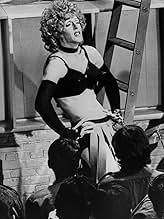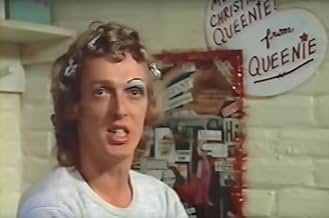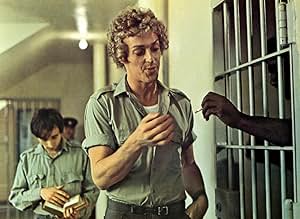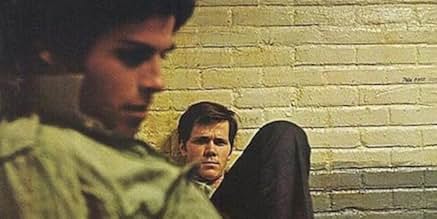AVALIAÇÃO DA IMDb
6,6/10
602
SUA AVALIAÇÃO
Adicionar um enredo no seu idiomaYoung, naive Smitty is sent to prison for six months and bunks with other convicts, specifically quiet cocky bully Rocky. Eventually Rocky offers protection to Smitty for a price and Smitty ... Ler tudoYoung, naive Smitty is sent to prison for six months and bunks with other convicts, specifically quiet cocky bully Rocky. Eventually Rocky offers protection to Smitty for a price and Smitty becomes a most reluctant sexual slave.Young, naive Smitty is sent to prison for six months and bunks with other convicts, specifically quiet cocky bully Rocky. Eventually Rocky offers protection to Smitty for a price and Smitty becomes a most reluctant sexual slave.
Lee Broker
- Screwdriver
- (as Larry Perkins)
Avaliações em destaque
I saw this film shortly after its release, when I was around 18 years old, and many of the scenes went right over my head. Watching it again now, I am amazed at how many scenes have stuck in my mind (especially the harrowing ending). Although (not surprisingly) dated, and clearly made on a very low budget, this film has a remarkable way of pacing the action and building tension: for instance, the almost-hallucinatory prison Xmas party seems to be going on forever until it suddenly erupts in violence.
In 1971, people were excited (or outraged) about the homosexual scenes, but I think it would be wrong to think that the film is "about" homosexuality. For me, it is about power structures in what Goffmann has called a "total institution". Sexuality, or rather rape, is just another tool to maintain power, along with violence and trade in tobacco and drugs.
It's a raw, brutal and uncomfortable film, and well worth watching.
In 1971, people were excited (or outraged) about the homosexual scenes, but I think it would be wrong to think that the film is "about" homosexuality. For me, it is about power structures in what Goffmann has called a "total institution". Sexuality, or rather rape, is just another tool to maintain power, along with violence and trade in tobacco and drugs.
It's a raw, brutal and uncomfortable film, and well worth watching.
It was a good thing they had a cast-audience group discussion following off-Broadway weekend performances of "Fortune and Men's Eyes."
That way whatever questions may have been on attendees' minds could be fielded directly to cast members and director, which were seated across the proscenium.
After the performance I had the pleasure of attending, I was struck by the candor of that production's "working family." Somehow, the intimate nature of the play appeared to make for great cast cohesiveness, and the discussion was lively and informative. It also provided greater clarity as to what both Playwright John Herbert had in mind and what the director was trying to express.
Unfortunately, in the film version (scripted by the playwright) there was something missing. Despite a fine cast delivering thoroughly thoughtful performances, an unrelenting downbeat pall seems to hover over everything.
It's been reported that the film's producers wanted the sensational qualities emphasized; they got their wish--probably at the expense of a broader, more poetic and philosophical statement of the human condition.
Michael Greer offered an outstanding Queenie, a character that is quite convincing. However, it's a bitter, sardonic soul whose surface sense of humor's only a cover for a wounded interior.
Zooey Hall's Rocky is likewise expertly rendered and completely believable--yet a crafty and cold individual with few redeeming qualities.
Wendell Burton's Smitty is the most empathetic character, yet a "pothead" and "looser"--not at all the "innocent" he purports to be.
Harvey Hart's & Jules Schwerin's codirection is adequate, given their parameters. Yet the entire production fails to rise much above the norm, despite many powerful and effective expose scenes.
It's interesting to note the careers of the above three lead actors: Burton had the most work, yet roles were few and far between, and he retired from acting at the early age of 40. Hall, despite his good looks and fine talent, only did three more films after this. Greer likewise had a very limited film career (his Queenie role perhaps seriously type casting him).
Though I never saw Sal Mineo's stage production, I heard that it was even more controversial and sensational than either of the above two versions.
And that's going some.
That way whatever questions may have been on attendees' minds could be fielded directly to cast members and director, which were seated across the proscenium.
After the performance I had the pleasure of attending, I was struck by the candor of that production's "working family." Somehow, the intimate nature of the play appeared to make for great cast cohesiveness, and the discussion was lively and informative. It also provided greater clarity as to what both Playwright John Herbert had in mind and what the director was trying to express.
Unfortunately, in the film version (scripted by the playwright) there was something missing. Despite a fine cast delivering thoroughly thoughtful performances, an unrelenting downbeat pall seems to hover over everything.
It's been reported that the film's producers wanted the sensational qualities emphasized; they got their wish--probably at the expense of a broader, more poetic and philosophical statement of the human condition.
Michael Greer offered an outstanding Queenie, a character that is quite convincing. However, it's a bitter, sardonic soul whose surface sense of humor's only a cover for a wounded interior.
Zooey Hall's Rocky is likewise expertly rendered and completely believable--yet a crafty and cold individual with few redeeming qualities.
Wendell Burton's Smitty is the most empathetic character, yet a "pothead" and "looser"--not at all the "innocent" he purports to be.
Harvey Hart's & Jules Schwerin's codirection is adequate, given their parameters. Yet the entire production fails to rise much above the norm, despite many powerful and effective expose scenes.
It's interesting to note the careers of the above three lead actors: Burton had the most work, yet roles were few and far between, and he retired from acting at the early age of 40. Hall, despite his good looks and fine talent, only did three more films after this. Greer likewise had a very limited film career (his Queenie role perhaps seriously type casting him).
Though I never saw Sal Mineo's stage production, I heard that it was even more controversial and sensational than either of the above two versions.
And that's going some.
Theme of homosexuality and rape in prison was very daring for its time (1971). You could feel the pain of the lead character as he succumbs to the brutal advances of his cellmate, while longing for his girlfriend.
I saw the movie when it first came out, and I still remember the line uttered by a prisoner as he observes a gang rape- "Nobody's going to stop a man from getting his oats." It's one of my all-time favorite quotes from films.
I saw the movie when it first came out, and I still remember the line uttered by a prisoner as he observes a gang rape- "Nobody's going to stop a man from getting his oats." It's one of my all-time favorite quotes from films.
I saw this in the Cosmo (pre GFT) in Glasgow one afternoon. The original and still the best movie on prison sex. Kept me to the straight and narrow! Powerful, unpleasant, occasionally verging on crudeness. Definitely best viewed after some libation. Not a date movie. Recommended - once.
Cold, grainy picture made in Canada follows naïve drug-user (Wendell Burton, excellent here as he was in "The Sterile Cuckoo") through rigors of prison life. Adapted from John Herbert's autobiographical play, originally performed in Los Angeles with Sal Mineo as producer, the movie is a curiosity piece, what with a sadly outré drag show and the usual homosexual content handled in somewhat sensational manner. Reportedly a troubled production, it is occasionally gripping and intense, yet impossibly downbeat. Several of the key supporting players are very good, and the narrative and scenario are more solid here than in the not-dissimilar "Short Eyes". ** from ****
Você sabia?
- CuriosidadesSal Mineo directed the 1969 Los Angeles production "Fortune and Men's Eyes and played the role of Rocky, a prison bully, who rapes a naive young prisoner, Smitty (played by Don Johnson in the L.A. production). Mineo's staging emphasized violence and sexuality. He added a scene to the play, staging Rocky's rape of Smitty in the prison shower, an event that had been kept off stage in earlier productions. The Los Angeles production, which was eventually moved to New York (without Mineo as an actor) featured full frontal nudity. Mineo also directed a subsequent San Francisco production. Although playwright John Herbert did not initially object to Mineo's alterations, he vociferously criticized Mineo's Los Angeles and New York stagings. (Being a convicted felon, the Canadian Herbert was unable to enter the U.S. to actually see the productions.) Herbert refused to sell him the film rights to his play, and the estrangement obviated any chance of Mineo being involved in the 1971 movie version of the play.
- ConexõesReferenced in Come of Age (1971)
Principais escolhas
Faça login para avaliar e ver a lista de recomendações personalizadas
- How long is Fortune and Men's Eyes?Fornecido pela Alexa
Detalhes
Bilheteria
- Orçamento
- CA$ 1.109.000 (estimativa)
- Tempo de duração1 hora 42 minutos
- Mixagem de som
Contribua para esta página
Sugerir uma alteração ou adicionar conteúdo ausente

Principal brecha
By what name was Sob o Teto do Demônio (1971) officially released in India in English?
Responda























